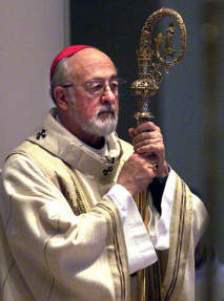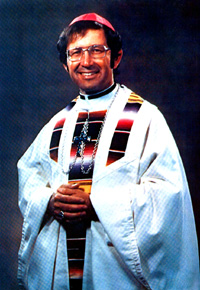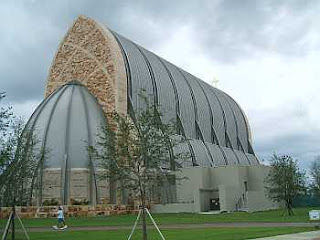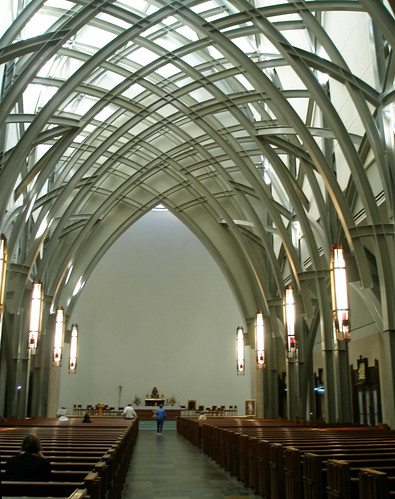If the Catholic Church were serious about preventing sexual abuse (which it is not), one simple method is available: audited accounting of all church financial records.
Almost invariably, sexual misconduct has been paid for by misuse or outright theft of church funds,
The case of Gary Mercure is only one of thousands:
The records reveal that Mercure systematically stole money from church coffers and used it to lavish young men and boys with cash, gifts and living expenses as he brazenly maintained a sexually active, homosexual lifestyle for decades.
The donations of the faithful funded Mercure’s lifestyle:
In 2008, when Bishop Howard J. Hubbard sought to confront Mercure about overwhelming evidence that he had sexually abused minors, the priest responded that he was on vacation and could not be reached by telephone.
But Hubbard, in an internal document, had his staff trace the phone number. They learned Mercure was secretly vacationing at a gay resort “where the choice to wear something or nothing is yours … (with) erotic video lounge showing adult male videos.”
Sexual activity is private and is sometimes hard to detect, but money can be traced with ease.
However, church officials are even less interested in ending theft than they are in ending sexual abuse.
One elderly pastor told me that he had never been in a parish in which someone was not on the take.
Diocese accounts are set up so that money can be siphoned off with ease. Perhaps this goes back to the feudal concept under the old canon law, in which the income of a parish was the property of the pastor. From that he paid his assistants, the upkeep of the church, the dollar a day he allowed to the nuns, etc.
The financial system in many dioceses is susceptible to theft or misappropriation, and dioceses show little interest in preventing it until the problem becomes public.
In Baltimore each parish has its own bookkeeper and accounts. There seems to be little overall supervision or regular auditing.

Father Nick Cieri on the left
and his housemate Father Larry Johnson in the center
with two young friends
Domenic Cieri was director of liturgy (1984-1992) in the archdiocese of Baltimore and then pastor (1992-2007) of St. Bernadette’s parish in Severn, Maryland, on the far southern fringe of the Baltimore metropolitan area.
There he set to accomplish two things: making St. Bernadette’s a gay-friendly parish and making himself financially comfortable. He succeeded in both.
In making St. Bernadette’s a national center of gay ministry, he set up several groups with the assistance of Ann McDonald.
As pastoral associate at St. Bernadette Parish on Stevenson Road, Ms. McDonald helped found Reclaim in 1997 as a group for homosexual adults to ease the pain of alienation they felt toward the church and its teachings. Today, she helps preside over a group that has grown significantly, touching on issues such as the Catholic church’s relationship with gay adults, as well as its relationship with the parents of gay children, gay families and even gay teenagers. The most recent branch of the group, called Recharge, is an alumni group for the more than 200 people who have completed Reclaim over the years and either have joined Catholicism though Baptism or reinvesting in the faith through Catechism and confirmation. Some gay members join Reclaim if only to feel comfortable enough in their spirituality to attend Mass again, Ms. McDonald said. The church’s pastor said the newest incarnation of Reclaim will help graduates stay energized about and connected to Christianity, if only by knowing they’re part of a larger religious family.|”Reclaim is about trying to touch people in a meaningful way,” said St. Bernadette Pastor Domenic L. Cieri. “The church teaches its members to love and be loved in return and we want to help gay and lesbian members feel wanted by the church and by God.”|With a progressive, 1,200-family congregation at St. Bernadette Parish, Ms. McDonald said, there are plenty of ways for gays and lesbians, no matter their religion, to find acceptance and learn that being gay is not a sin. With dozens of pamphlets about gay and lesbian issues in the church office and vestibule, straight congregation members have numerous opportunities to educate themselves and realize that being gay is not an evil choice, Ms. McDonald said,
This was all done with the blessing of the Archdiocese of Baltimore:
With the Catholic church struggling with a myriad of issues, Reclaim is a step ahead of many of the 161 churches in the Archdiocese of Baltimore.|”Reclaim is a good gateway to educate people on the church’s teachings,” said Deacon Paul A. Weber, director of the Office of Ministry with Gay and Lesbian Catholics for the Archdiocese. “Many communities, quite frankly, are unfamiliar with issues of same-sex orientation.”|According to the Rev. Weber and Ms. McDonald, no one at St. Bernadette or the Archdiocese of Baltimore hierarchy has ever voiced any objections to Reclaim, even though some Catholic circles frown upon the practice of homosexuality.”
It is not clear whether St. Bernadette’s and the Archdiocese are or are not among those Catholic circles which frown upon the practice of homosexuality. However the parish’s web site claims that it is “providing pastoral care in keeping with the church’s teaching on chastity.” It is not clear which teaching this is referring to – Dominic Cieri’s or the Vatican’s.
(In July 2008 Ann McDonald was appointed Pastoral Life Director at St. Bernadette’s.)
Bishop Mitchell T. Rozanski of the Archdiocese of Baltimore participated in this work at St. Bernadette’s:
With a message of humility, faith in times of suffering and God’s unconditional love, a bishop with the Archdiocese of Baltimore celebrated Mass yesterday at a service devoted to gay and lesbian Catholics.
“‘As bishop, being here this afternoon in this community, I do so with genuine affection and gentleness to you,’ Bishop Mitchell T. Rozanski, the eastern vicar, told those gathered at St. Bernadette Roman Catholic Church in Severn, [Md.,] a parish that has had a thriving gay and lesbian ministry since 1997.
“Reflecting on Scripture readings about the Apostle Paul’s admiration for the Thessalonians as ‘faithful people who embraced the cross at a time of suffering,’ the bishop added, ‘In our own time, you know the struggle, some of you, of being gay and lesbian.’
“The service – the second in five years sponsored by Baltimore’s Archdiocesan Ministry with Gay and Lesbian Catholics and offered by St. Bernadette’s – attracted same-sex couples, single gay men and women, and parents of gay children, as well as churchgoers hoping to send a message to Catholic leaders with their presence at such a Mass.
“Attendees traveled from Pennsylvania, Virginia, the District of Columbia and across Maryland for the religious service – and, more important, they said, an inclusive welcome that is not available to them at many Catholic parishes.
Cieri’s work in making St. Bernadette’s a gay-friendly parish was acknowledged by the National Association of Catholic Diocesan Gay and Lesbian Ministries and by New Ways Ministry. He explained: “My integrative awareness status is indicated to me by the work in establishing safe and welcoming places for GBLT in my parish.”
He explains what he means:
“I identity as a white, middle-class, suburban gay male…You might say I am a soft male (my words). I am not macho and never have been.
“At the time of puberty I was very aware of being attracted to males. This was somewhat distressing, Even though I wanted to be a priest, I still had a desire to have a family. I began to wonder what it would be like to be a girl. Then I could get married and have a family with the boy of my dreams.
Cieri claims that his pro-gay work got him into trouble: “Naturally it got me into trouble with Church authority.” This does not seem to be the case; auxiliary bishops (Bishop Newman and Bishop Rozanski) spoke at St. Bernadette’s and praised the work there. Something else led to trouble for Domenic Leo Cieri.
While demonstrating a revisionist attitude toward traditional morality on sexuality, Cieri also set about his second goal of achieving financial comfort.
In 1999, 2000 and 2005 St. Bernadette’s, a very-well-to do suburban parish, ran an operating deficit. This is not surprising in light of what was later revealed.
In October 2006 Archbishop Keeler of Baltimore was in a serious automobile accident. He needed brain surgery in June 2007, and was therefore out of commission and had to be replaced by Archbishop Lori in July 2007.
Immediately after the accident, in October 2006, and after it had received an anonymous tip, the Archdiocese conducted an audit of St. Bernadette’s with special attention to compensation and was not happy with the results.
Domenic Cieri was pastor of St. Bernadette’s in Severn. He was supposed to be in residence there and receiving compensation according to an archdiocesan scale.
In fact (see here and here and here):
· Cieri was not in residence at St. Bernadette’s. He was living in Glen Arm, 34 miles away, in a house he had purchased with the Rev. Lawrence Johnson (former agent for the AIDS Interfaith Network of Central Maryland and now chaplain at Stella Maris) in 2001 for $255,000. The house is currently estimated at $455,000.
· Cieri earned nearly $48,000 a year for the fiscal year ending in June 2006, about 70 percent more than the $28,122 that the archdiocese says he was to earn as a pastor ordained for 25 years. His pay and other compensation was hidden in the budgeted single line item of $475,000 for “Salary and related.”
· Cieri was reimbursed nearly $36,000 for rectory expenses, although he did not live in the rectory attached to the church.
· Cieri received $14,000 as a housing allowance,
· Cieri received $6,300 in Mass stipends. Priests have the choice of receiving Mass stipends for individual Masses or a lump sum of $2,000 per year – for all masses an amount set by the archdiocese.
· Cieri, since he was not in residence, paid other priests to do his work. The church also paid a lot of money in stipends to visiting priests who celebrated some of the church’s four Masses each weekend,
· The lay parish officials had approved all payments, so there was no possibility of the parish recovering any of the money. The leaders thought that because others on staff earned salaries in the $40,000 range, it was appropriate to pay the pastor a comparable wage. They said they felt manipulated by the Rev. Cieri in approving his salary and compensation.
· According to the Bishop Rozanski, the archdiocese has no plans to formally reprimand or punish the Rev. Cieri, and his fate will depend on his own decisions after he ends his leave.
It is not clear whether this extra compensation was the annual or the total figure; it seems to be annual. If that is the case, during his pastorate Cieri received about $1 million more than archdiocesan guidelines provided.
Cieri resigned on May 29, 2007, because of, he explained, “differences regarding fiscal policies.” That’s one way of putting it. Cieri’ s attitude to the priesthood seems to be based on that of Pope Leo X, who is reported to have said on his election “God has given us the papacy; let us enjoy it.”
Cieri claims he is experienced in “financial management.” Under the name of Nick Cieri, he became a financial advisor with SmithBarney and then with First Financial Group. In this capacity he was
Licensed to sell insurance products and to offer securities in the Mid-Atlantic States, Nick Cieri serves as a Financial Advisor for MassMutual Financial Group, a marketing segment of Massachusetts Mutual Life Insurance Company (MassMutual or MML). Headquartered in Hunt Valley, Maryland, Nick Cieri operates as a registered representative delivering investment advisory, securities, and financial planning services through MML Investors Services, LLC, a member of the Securities Investor Protection.

An expert financial counselor – ask St. Bernadette’s!
He would help his clients engage in careful financial planning to achieve their financial goals – as he had done.
A seasoned financial advisor, Nick Cieri serves clients through MassMutual Financial Group, a firm located in Hunt Valley, Maryland. Understanding that financial planning often involves a great deal of anxiety, Mr. Cieri offers all of his clients the personalized attention and insight that they deserve. Individuals come to MassMutual Financial Group for a variety of reasons. Some want assistance with preparations for college, retirement, or other life milestones, while others simply need reliable life, long-term care, or disability income insurance. Nick Cieri listens closely to the needs of each client, discusses the relevant options, provides them the information necessary to make an informed decision, and connects them to the best products and services available. Mr. Cieri places his clients’ well-being above all else and is committed to integrity (my emphasis).
Through his practice, Nick Cieri gives clients advice about navigating today’s complex markets to achieve financial freedom. He employs a team of experienced professionals who support his mission with expertise in retirement services, annuities, charitable giving, executive compensation, and estate planning. When clients first come to Mr. Cieri, he performs a comprehensive audit of their financial situations to accurately represent where they stand. After discussing expectations and strategy with clients, he matches them to the products that will best help them achieve their goals, which often involves a diverse array of services.
It should be a great comfort to clients to know that Cieri is “committed to integrity,” as his record so clearly demonstrates.
Cieri is now a substitute school counselor in the Baltimore County public schools.
I had met Cieri when he was the director of liturgy for the archdiocese. Cieri would frequently come to say mass at the Shrine of the Sacred Heart in Mount Washington, where the pastor was Nicholas Amato, who had worked with Cieri in the central offices because Amato had been archdiocesan director of education. Cieri explained to me that Jesus had not initiated the Catholic priesthood, but it was started centuries later. I pointed out that this was what the fundamentalists also claimed. I mentioned to Cieri that the Baltimore Sun had reported that half the members of the burgeoning evangelical and charismatic churches around Baltimore were former Catholics. He said they had left because Catholicism was too perfect for them, and we should not try to persuade them to come back. I now suspect that he feared that might bring back with them their ideas about sexual morality, which they had learned from the highly unreliable source of the Bible.

Toodle-oo!


/199-ClownMass.jpg)











